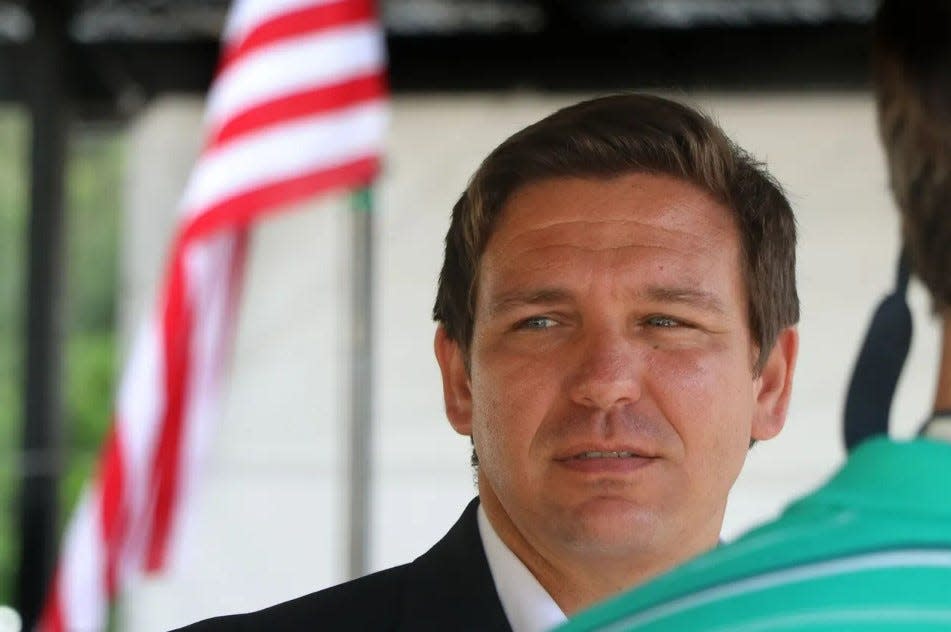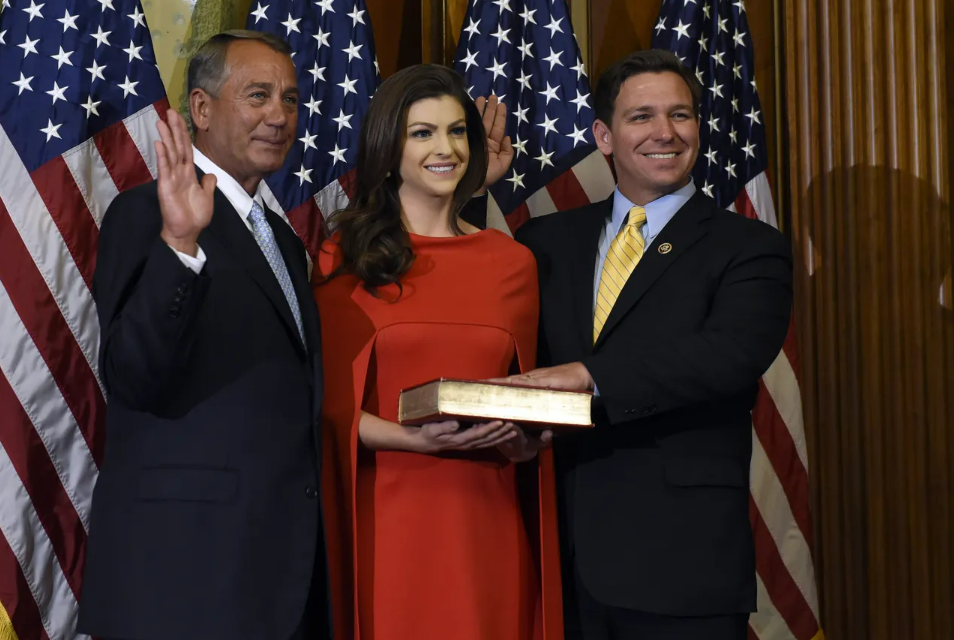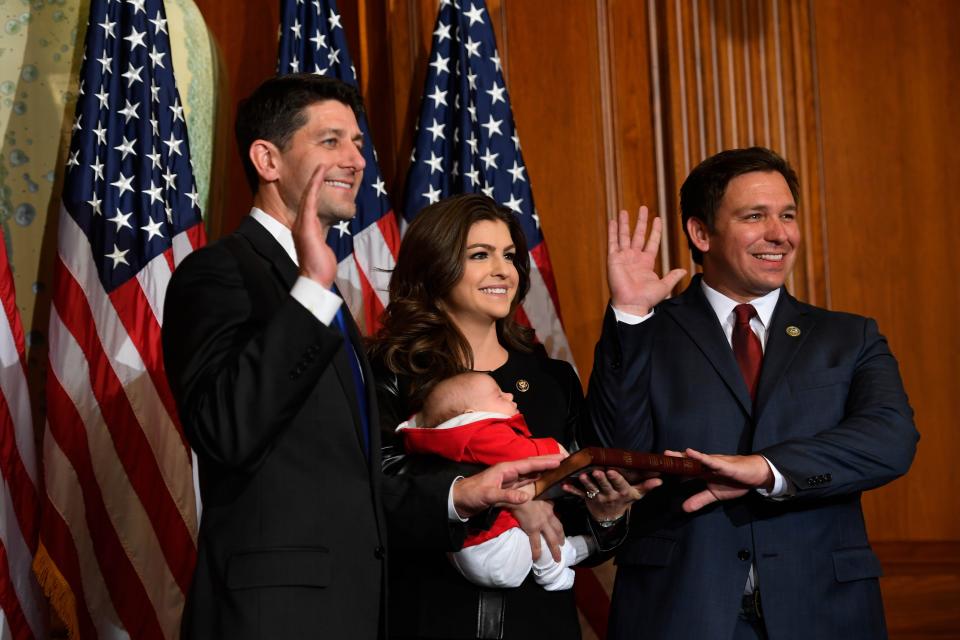As a local congressman, DeSantis always had his sights set on bigger things

- Oops!Something went wrong.Please try again later.
- Oops!Something went wrong.Please try again later.
- Oops!Something went wrong.Please try again later.
- Oops!Something went wrong.Please try again later.
Ron DeSantis was a complete unknown when he first started calling donors, knocking on doors, and campaigning for a newly drawn, open U.S. House seat spanning Volusia, Flagler, St. Johns, and Putnam counties.
Now, only 11 years later, he's become a serious contender for president.
But even as a young congressman representing Florida's 6th District, which includes Daytona Beach, New Smyrna Beach, Palm Coast, and other communities, it was apparent that he had his eyes on something bigger.
“I think Ron served us on a macro level,” said Vic Baker, state committeeman for the Volusia County Republican Executive Committee. “I don’t think he was considered a pothole congressman or a pork-barrel congressman.”
DeSantis is expected to launch his bid this week with the filing of election paperwork. He will reportedly follow that with a formal announcement in his hometown of Dunedin on Florida's west coast.
Rise of the tea party
DeSantis entered politics following the rise of the tea party movement - a reaction to the 2008 election of Barack Obama and the passage of the Affordable Care Act. The law made health insurance more widely available but included an individual mandate to purchase health insurance, opposed by many conservatives.
They said Obama and other Democrats were operating outside the scope of the Constitution and the principles of its authors.
DeSantis, a Navy veteran who was working as an attorney and living in Ponte Vedra Beach in 2011, wrote a book titled: Dreams From Our Founding Fathers: First Principles in the Age of Obama. The book was a critique of the president and its title a not-so-subtle reference to Obama's 1995, best-selling memoir, Dreams from My Father: A Story of Race and Inheritance.
Early in 2012, DeSantis jumped into the race for Florida’s 6th District after longtime Congressman John Mica announced he would be moving to the 7th District, covering Seminole County, where he lived.
In the first quarter of 2012, DeSantis raised $217,000, good enough to lead the GOP field. At a conservative gathering in Holly Hill in April, DeSantis said: "We're at a crossroads as a nation. We're walking away from some of the fundamental principles that define us as a country."
Sunshine State Support Nearly 100 Florida lawmakers back DeSantis for president, including most of local delegation
Hurricane Relief: DeSantis announces $100 million in help. Here's how much Volusia County got
Florida Legislature 2022: When DeSantis zigged, GOP lawmakers from Volusia, Flagler did too
Taking aim at Obama
At a debate among five of the seven GOP candidates in DeLand in May, DeSantis took aim at Obama, whose face he said won’t wind up on Mount Rushmore or on U.S. currency.
"A good place for him to be is on the food stamp," DeSantis said. "It's funny, but the thing is, we've seen millions of more people end up on dependency programs. He wants people dependent on the government every step of the way."
He didn’t mention that millions of Americans had lost jobs while the wealth of middle-class households dropped during the Great Recession, which started in 2007 with the subprime mortgage crisis before Obama took office.
In that 2012 campaign, DeSantis earned the endorsement of two of his future political opponents: Adam Putnam, whom he would beat in the 2018 Republican primary for governor, and Donald Trump, who had yet to run a full-fledged campaign but was a fixture on television as host of “The Celebrity Apprentice.”
Ron DeSantis, Iraq vet, Navy hero, bronze star, Yale, Harvard Law, running for Congress in Fla. Very impressive. http://t.co/kkPDZv7r
— Donald J. Trump (@realDonaldTrump) March 20, 2012
Doing what it takes to win
With so many candidates in the primary race, DeSantis was forced to hit the streets, driving his Ford F-150 all over neighborhoods, speed-walking door-to-door to earn votes. His wife, the former Casey Black, a Jacksonville news reporter and anchor he married at Walt Disney World Resort in 2009, was also a big part of the door-knocking campaign.
Their efforts also led the field in raising money for television spots.
“You do these ads, and they’re important,” DeSantis told The News-Journal at the time. “But at the end of the day, I think some of that becomes background noise so that personal contact becomes even more important.”
DeSantis was able, though, to raise enough money to attack his opponents in ways they objected to: DeSantis mailers labeled Fred Costello and Craig Miller “tax and spend liberals … we can’t afford.” Another said Bev Slough and Richard Clark wasted taxpayer money.

Those opponents decried the ads as half-truths that amounted to big lies.
"I thought he had the potential to be a future statesman once he got experience at the state or local level," Costello, a state House representative and former Ormond Beach mayor, said at the time. "Now I don't know. He's shown himself willing to lie. An election is not worth losing your integrity."
A big win
DeSantis won the primary by a wide margin, with 38.8% percent of the vote. Next closest was Costello, who was 16 points behind.
In the runup to the general election, DeSantis’ message included bits about refusing a congressional pension (which he later did), limiting government, opposing tax increases, and the Affordable Care Act, also known as Obamacare, favoring a rigid interpretation of the Constitution and “being faithful” to the vision of the founding fathers.
DeSantis, with a Republican-leaning district and a decided fundraising advantage over Democrat Heather Beaven, won with 57.2% of the vote. He improved on that in the 2014 election, with 62.5%, and won again in 2016 with 58.6%.
Entering Congress with controversy
Sworn in by House Speaker John Boehner on Jan. 3, 2013, DeSantis was assigned to the House Judiciary Committee, the House Committee on Government Reform and Oversight, and the House Committee on Foreign Affairs.
Those committees were a good fit, say local Republicans who followed DeSantis’ career.
On one of his first days in office, DeSantis faced a vote that challenged his pledge of fiscal restraint in the face of a growing federal deficit. He voted against $9.7 billion in flood insurance aid for victims of Hurricane Sandy, the "superstorm" that hit New York and New Jersey the previous October.
DeSantis said he sympathized with the victims but added: "Allowing the program to increase its debt by another $9.7 billion with no plan to offset the spending with cuts elsewhere is not fiscally responsible."

In that first year, DeSantis routinely had public appearances and town halls in the district.
But as time went on, he faced criticism for appearing more interested in landing Fox News hits than meeting with locals. DeSantis became a regular guest on Fox, speaking about Obama’s policies on health care, Afghanistan, and Iran, among other things.
While this approach rankled some, others weren't bothered by it.
"I was very happy he was concerned about national security,” said Sharon Demers, state committeewoman for the Flagler County Republican Executive Committee. “He understood from being in the military the importance of protecting our country on all fronts.”
She said some of DeSantis’ opponents were critical that he didn’t focus as much on the workings of the district, such as bringing jobs home to the Volusia-Flagler area.
“That’s not a congressman’s job, to bring jobs. A congressman’s job is to secure our country, keep taxes down and he was a constitutional conservative, and I appreciated that,” Demers said.
Democrat: 'No time' for us
Jewel Dickson, the Volusia County Democratic Party chair since 2016 and native Floridian, said DeSantis was highly partisan.
“He didn’t have any time to talk to us. No time,” she said.
In 2017, she attended a rare town hall DeSantis held at Bethune-Cookman University in Daytona Beach. Tempers flared, with many DeSantis supporters seated in the lower deck of the Mary McLeod Bethune Performing Arts Center, and many opponents filling the balcony seats.

DeSantis held the lone microphone, yet was frequently drowned out by the audience, some of whom were concerned about impending congressional votes to repeal Obamacare.
“Often during the forum, the congressman found himself having to stand quietly until the crowd calmed or was forced to yell over the cacophony,” The News-Journal reported.
Forming the House Freedom Caucus
In January 2015, DeSantis was one of nine Republican House members who formed the House Freedom Caucus. The conservative Republicans were dissatisfied with Boehner, believing he was too willing to concede to Obama and the Democrats.
Matthew Green is the author of Legislative Hardball: The House Freedom Caucus and the Power of Threat-Making in Congress.
He said DeSantis was not one of the more outspoken members in 2015 when the Freedom Caucus was working to make change from the inside, pushing back against Republican-backed proposals that members didn’t believe were conservative enough.
“They were a big enough faction when they were voting with Democrats to kill bills and special rules. They were making credible threats to leadership. … It split the Republican Party,” said Green, who is a professor of politics at Catholic University in Washington, D.C.
By September, Boehner had enough and announced his resignation.
Green said the Freedom Caucus evolved in 2016-2017, as Trump was elected and took office.
Becoming more 'Trumpy'
“In 2015-2016, the Freedom Caucus was less interested in getting headlines and more interested in getting conservative legislation passed,” he said. “What happened after 2016, they became more public, frankly more ‘Trumpy,’ more provocative, active on social media trying to ‘own’ the libs.”
Now they were playing more of an “outside” game, and DeSantis changed along with them.
As a governor, Green said DeSantis has pursued “anti-woke” policies and taken on Disney, positions that stoke the base and reach a national audience.
By 2015, DeSantis entered the race for U.S. Senate, with Marco Rubio planning a run for president.
He faced an uphill climb. A Quinnipiac poll in August 2015 showed 87% of Floridians didn’t know enough about DeSantis to register an opinion on him.
Several months into 2016, the race appeared wide open, but when Trump defeated Rubio in the GOP presidential primary, that changed. Rubio, who had said he was leaving the Senate, decided two days before qualifying that he was going to seek re-election after all.
With an incumbent in the GOP primary, DeSantis dropped out to seek re-election to his House seat.
Cruising to another victory
While most of a large crowd of Republicans seeking to replace DeSantis dropped out, Costello and G.G. Galloway remained. Both were well-known figures from Ormond Beach hoping that redrawn district boundaries that placed all of Volusia County into the 6th might give them an advantage.
“We knew without a doubt that with Ron DeSantis, there would not be much of a chance of winning,” said Baker, who was serving as Costello’s campaign manager. “We had nothing to hit him with, other than residency at the time, which is very weak.”
DeSantis easily cruised to victory and became an ally of Trump.
Leaving Washington for Tallahassee
With Republican Gov. Rick Scott on his way out after two terms, rumors swirled about DeSantis eyeing a move to Tallahassee.
Then on a Friday in December, as President Donald Trump was headed to Mar-a-Lago for Christmas, he tweeted: "Congressman Ron DeSantis is a brilliant young leader, Yale and then Harvard Law, who would make a GREAT Governor of Florida. He loves our Country and is a true FIGHTER!"
That sent the DeSantis campaign into action. While many had expected Putnam, the state's commissioner of agriculture, to easily win the GOP nod in 2018, DeSantis was suddenly viable.
He spent much of the year focused on the August primary, but shuttling between Florida and Washington, to do his day job. His win over Putnam put DeSantis into a tight race against Democrat Andrew Gillum.
It also led him to announce on Sept. 10, 2018: "As the Republican nominee for governor of Florida, it is clear to me that I will likely miss the vast majority of our remaining session days for this Congress. Under these circumstances, it would be inappropriate for me to accept a salary."
He resigned from Congress. Now he wants to return to Washington − as president.
Baker and Demers said DeSantis remembers his political roots, and people in his district who aren't Democrats think well of him.
"People fondly remember him here in New Smyrna Beach," said Baker, a resident of the city. "He and Casey knocked on thousands of doors, many of them here, and he regards New Smyrna Beach as the adoptive birthplace of his political career."
Baker said DeSantis served in Congress "with distinction."
"I know how his story will end," Baker said. "I can tell you this man has a vision, whether it is a vision fulfilled in 2024 or 2028 remains to be seen."
This article originally appeared on The Daytona Beach News-Journal: Ron DeSantis in Congress: Freedom Caucus, Fox News, fighting Obama

